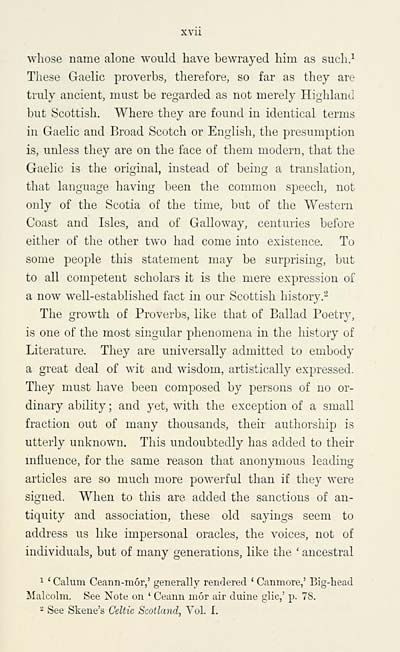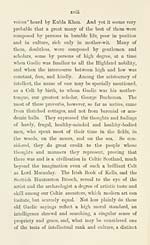Download files
Complete book:
Individual page:
Thumbnail gallery: Grid view | List view

whose name alone would have bewrayed him as sucli.^
These Gaelic proverbs, therefore, so far as they are
truly ancient, must be regarded as not merely Highland
but Scottish. Where they are found in identical terms
in Gaelic and Broad Scotch or English, the presumption
is, unless they are on the face of them modern, that the
Gaelic is the original, instead of being a translation,
that language having been the common speech, not
only of the Scotia of the time, but of the Western
Coast and Isles, and of Galloway, centuries before
either of the other two had come into existence. To
some people this statement may be surprising, but
to all competent scholars it is the mere expression of
a now well-established fact in our Scottish history .^
The growth of Proverbs, like that of Ballad Poetr}^,
is one of the most singular phenomena in the history of
Literature. They are universally admitted to embody
a great deal of wit and wisdom, artistically expressed.
They must liave been composed by persons of no or-
dinary ability ; and yet, with the exception of a small
fraction out of many thousands, their authorship is
utterly unknown. This undoubtedly has added to their
influence, for the same reason that anonymous leading
articles are so much more powerful than if they were
signed. When to this are added the sanctions of an-
tiquity and association, these old sayings seem to
address us like impersonal oracles, the voices, not of
individuals, but of many generations, like the ' ancestral
1 ' Calum Ceann-mor,' generally rendered ' Canmore,' Big-head
Malcolm. See Note on ' Ceann mor air duine glic,' p. 78.
^ See Skene's Celtic Scotland, Vol. I.
These Gaelic proverbs, therefore, so far as they are
truly ancient, must be regarded as not merely Highland
but Scottish. Where they are found in identical terms
in Gaelic and Broad Scotch or English, the presumption
is, unless they are on the face of them modern, that the
Gaelic is the original, instead of being a translation,
that language having been the common speech, not
only of the Scotia of the time, but of the Western
Coast and Isles, and of Galloway, centuries before
either of the other two had come into existence. To
some people this statement may be surprising, but
to all competent scholars it is the mere expression of
a now well-established fact in our Scottish history .^
The growth of Proverbs, like that of Ballad Poetr}^,
is one of the most singular phenomena in the history of
Literature. They are universally admitted to embody
a great deal of wit and wisdom, artistically expressed.
They must liave been composed by persons of no or-
dinary ability ; and yet, with the exception of a small
fraction out of many thousands, their authorship is
utterly unknown. This undoubtedly has added to their
influence, for the same reason that anonymous leading
articles are so much more powerful than if they were
signed. When to this are added the sanctions of an-
tiquity and association, these old sayings seem to
address us like impersonal oracles, the voices, not of
individuals, but of many generations, like the ' ancestral
1 ' Calum Ceann-mor,' generally rendered ' Canmore,' Big-head
Malcolm. See Note on ' Ceann mor air duine glic,' p. 78.
^ See Skene's Celtic Scotland, Vol. I.
Set display mode to: Large image | Transcription
Images and transcriptions on this page, including medium image downloads, may be used under the Creative Commons Attribution 4.0 International Licence unless otherwise stated. ![]()
| Early Gaelic Book Collections > Blair Collection > Collection of Gaelic proverbs and familiar phrases > (21) |
|---|
| Permanent URL | https://digital.nls.uk/76277521 |
|---|
| Description | A selection of books from a collection of more than 500 titles, mostly on religious and literary topics. Also includes some material dealing with other Celtic languages and societies. Collection created towards the end of the 19th century by Lady Evelyn Stewart Murray. |
|---|
| Description | Selected items from five 'Special and Named Printed Collections'. Includes books in Gaelic and other Celtic languages, works about the Gaels, their languages, literature, culture and history. |
|---|

